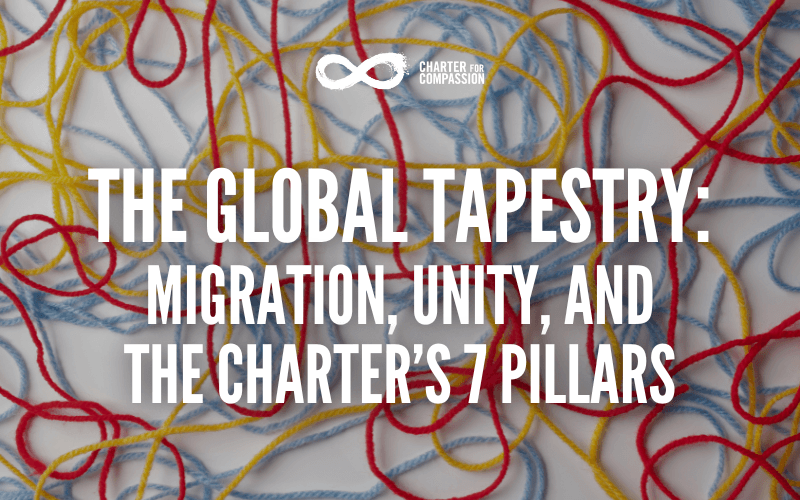
"We are caught in an inescapable network of mutuality, tied in a single garment of destiny."— Dr. Martin Luther King, Jr.
In our last newsletter, we introduced an important evolution in the Charter for Compassion’s work: the transition from 12 sectors to 7 foundational pillars. This shift is not about abandoning our past—it’s about strengthening it. By adopting the pillar format, we are grounding our future in the ethical and moral wisdom drawn from Indigenous traditions and the lived realities of our global family. These pillars reflect the holistic, interconnected way that compassion must live in our world today.
The 7 Pillars of the Charter are:
Education and Wisdom
Health and Wellbeing
Social Justice and Social Equity
Arts and Culture
Environment and Climate
Science and Research
Spirituality and Interfaith Understanding
Together, they offer a more integrated, values-based framework that honors both ancient knowledge and modern challenges. As we embrace this structure, we are reminded of a central truth—one echoed across time and space:
We are all migrants. And we are all one.
Humanity’s Shared Journey: Out of Africa and Across the Globe
The story of human migration is the story of us all. Scientific discoveries, genetic research, and archaeological evidence all affirm that humanity began in Africa—and that every person alive today is part of that original journey.
The widely accepted “Out of Africa” theory, supported by paleoanthropologists like Richard Leakey and by genetic studies of mitochondrial DNA, tells us that modern Homo Sapiens originated in Africa around 200,000–300,000 years ago. From there, small groups ventured outward—compelled by curiosity, scarcity, and change—and gradually populated every corner of the planet.

Threads Across Continents
One of the earliest known migrations brought humans to Australia some 50,000–65,000 years ago. The ancestors of Aboriginal Australians carry some of the world’s oldest continuous genetic lineages, and the rock shelter at Madjedbebe provides archaeological evidence of human presence dating back at least 65,000 years. These early travelers adapted to new lands while preserving cultural wisdom that remains alive today.
Another profound migration—the journey to the Americas—unfolded more recently. Though long thought to have occurred around 15,000 years ago via the Bering Land Bridge, new evidence, including footprints found at White Sands, New Mexico, suggest humans were present in the Americas as early as 21,000–23,000 years ago. These findings illuminate a rich and complex chapter in the human story.
One Humanity, Many Stories
Despite the distances that separate continents, the similarities among us are striking. Across cultures, we tell stories of origins, migration, ancestors, and belonging. From the Aboriginal Dreamtime to Native American and African creation myths, there are shared themes of unity, resilience, and reverence for the Earth.
Genetically, we are even more united. Over 99% of our DNA is shared across all human beings. The variations we see are merely adaptations to geography and climate. At our core, we are one species, one human family.
Migration Is Not Past—It Is Present
Migration is not a relic of the past. It continues today, shaped by war, climate change, poverty, and opportunity. As people seek safety and dignity, we must resist narratives of division and instead remember that migration is how we all got here. Our ancestors were migrants. Their courage and movement gave rise to the world we now share.
Compassion and Connection in a Borderless History
The Charter’s 7 Pillars are an invitation to reimagine our world as an interwoven whole—where education, health, justice, art, environment, science, and spirituality are not separate silos but threads in a global tapestry. They remind us that to act compassionately is not just a moral choice—it is a return to the truth of our shared origin and destiny.
Let us draw from this legacy as we move forward—not only in policy or practice but in heart and vision. The journey of humanity is a story of movement, connection, and becoming. And it continues, through each of us. We look forward to continuing this journey with you.
And if you haven’t yet, we invite you to help us shape the future:
Contribute to Charter for Compassion 2.0
With warm regards,
Marilyn Turkovich


